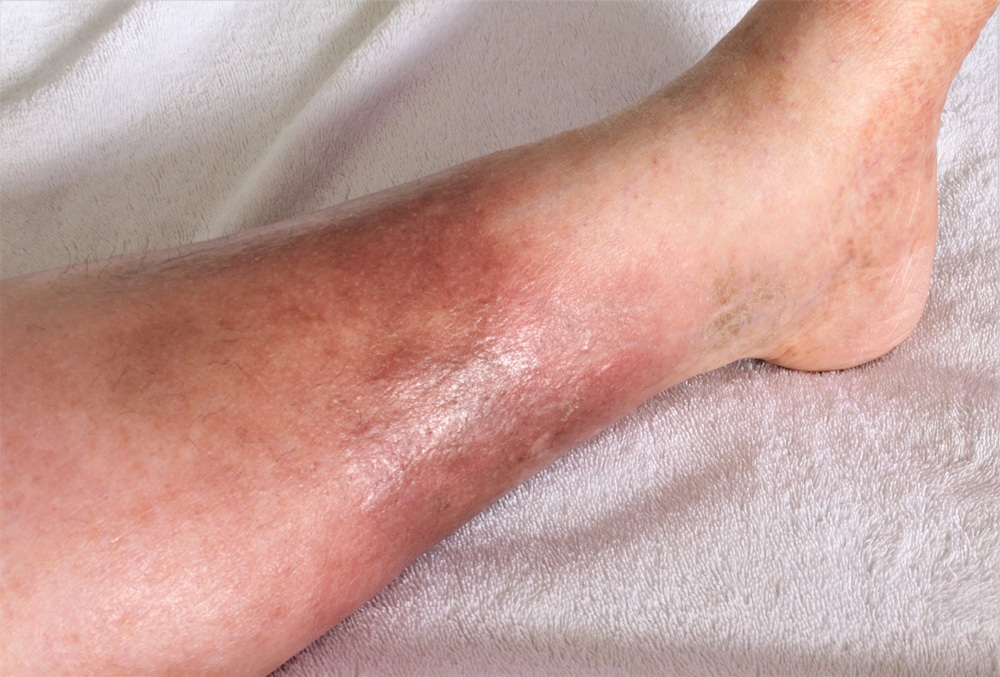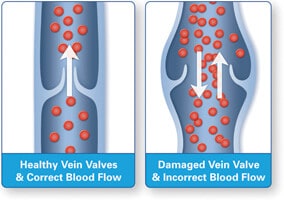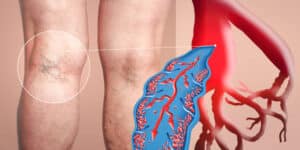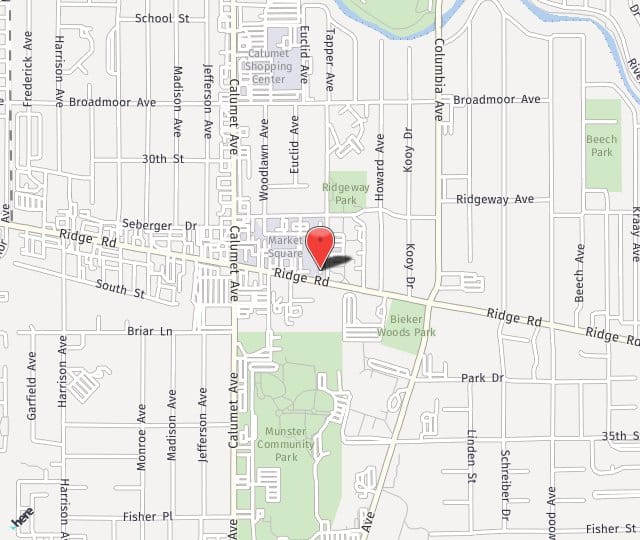Do your legs feel sore, tired, or puffy after a long day on your feet — or even after sitting for a while? You might be dealing with something called chronic venous insufficiency (CVI). It happens when the valves in your leg veins stop working right. The upside? There's real relief available at Region Vein. Our board-certified board-certified venous and lymphatic medicine specialist, Dr. Demetrios J. Karamichos, offers comprehensive solutions for patients struggling with frustrating CVI symptoms in our state-of-the-art office in Munster, IN.

What is Chronic Venous Insufficiency (CVI)?
CVI occurs when the veins or valves in the leg veins are not working correctly, making it difficult for blood to return to the heart from the legs. This can result in blood pooling in the veins, which can cause swelling, inflammation, and even blood clots.
What are the symptoms of Chronic Venous Insufficiency?
Some common symptoms of CVI include:
- Leg pain.
- Fatigue
- Heaviness.
- Itching or burning sensations in the legs.
- The skin on the legs may become discolored.
- Leg ulcers in severe cases.
The severity of these symptoms can vary depending on the stage of the condition.
What causes Chronic Venous Insufficiency?
The veins in our body are responsible for returning blood to the heart from all organs. In the legs, the blood needs to flow upward from the veins to reach the heart. To facilitate this, the calf muscles and the muscles in the feet contract with each step to squeeze the veins and push the blood upward. Your veins have one-way valves to prevent the blood from flowing back down.
When these valves become damaged because of aging, extended periods of sitting or standing, or a combination of aging and reduced mobility, it can lead to chronic venous insufficiency (CVI). This occurs when the weakened valves allow the blood to leak backward, making it difficult for the blood to flow up to the heart. As a result, blood pressure in the veins stays elevated for prolonged periods, which can lead to the development of CVI.
CVI is usually caused by damage to the veins or valves in the legs.


What are the risk factors Chronic Venous Insufficiency?
If you have risk factors for CVI, you are more likely than other people to develop the disease.
In most cases, CVI is hereditary, meaning it can run in families.
Other risk factors can include:
- Age over 50
- Obesity
- Pregnancy
- Smoking
- Female
- Prolonged standing or sitting
- Sedentary lifestyle
An estimated 40 percent of people in the United States have CVI. It occurs more frequently in people over age 50 and more often in women than in men.
If you are at risk for CVI or are experiencing any symptoms, it is important to see a vein doctor. At Region Vein, we perform a physical examination, review your medical history, and order diagnostic tests to determine if you have CVI.
Treatment for CVI
Treatment for CVI may include lifestyle changes, such as:
- Exercise and weight loss
- Compression stockings
- Medications
In many cases, these measures help very little if at all. These lifestyle changes are typically recommended as a first-line treatment by insurance companies, prior to approving definitive treatment.
It is important to manage CVI to prevent complications such as blood clots, skin ulcers, and infections. With proper treatment and management, most people with CVI can live normal, healthy lives.
Two effective medical treatments are:
Ultrasound-Guided Foam Sclerotherapy
For this treatment, Dr. Karamichos uses ultrasound imaging to guide a fine needle into the problem vein. He injects a special foam solution that expands inside the vein to seal it shut. Blood is then naturally rerouted to healthier veins, improving circulation and reducing symptoms like swelling, pain, and visible veins. This approach can be ideal for twisted or hard-to-reach veins in patients with chronic venous insufficiency.
Endovenous Ablation
This treatment uses laser or radiofrequency energy to heat and close diseased veins from the inside. With this treatment, Dr. Karamichos inserts a thin catheter into the affected vein using ultrasound guidance. He administers the energy through the catheter to gently heat the vein wall. This causes its collapse and closure. Once closed, blood naturally reroutes to healthier veins nearby. The procedure is performed in the office with local anesthesia and involves little to no downtime. It's often highly effective for varicose veins in patients with CVI.
Frequently Asked Questions About CVI
What is CVI?
CVI happens when your legs have trouble sending blood back to your heart. This causes blood collection and pooling in the lower legs, leading to swelling, discomfort, and visible vein changes.
What are the symptoms of CVI?
Common symptoms include leg swelling, aching, heaviness, cramping, itching, and skin discoloration. Some may also notice bulging varicose veins or open sores near the ankles.
Is CVI dangerous?
While not usually life-threatening, CVI can get worse over time if left untreated. If open sores develop, it may lead to painful skin changes, leg ulcers, or even infections.
Who is at risk for CVI?
People who are over 50, those with sedentary lifestyles, and people who struggle with their weight are more likely to develop CVI. Women and people who have had blood clots are also at higher risk.
How is CVI diagnosed?
At Region Vein, PC, we use a simple, noninvasive test called duplex ultrasound to check your leg veins. This helps us see how well your blood is flowing and locate areas where veins may not work correctly.
Can CVI be treated?
Yes. CVI is very treatable. Lifestyle changes, like wearing compression stockings, regular exercise, and avoiding extended standing or sitting, can help. We also offer advanced treatments like minimally invasive vein procedures to restore healthy blood flow.
What procedures are available at Region Vein?
Dr. Karamichos offers several modern treatments, including Radiofrequency ablation, Varithena and foam sclerotherapy. These procedures are safe, quick, and done right in the office with little to no downtime.
Will treatment stop my symptoms?
Many patients feel relief soon after treatment. While some symptoms may take time, most people experience better comfort, less swelling, and healthier-looking legs.
Is CVI the same as varicose veins?
Not exactly. Varicose veins may be a sign of CVI, but CVI is the underlying issue with how the veins function. Treating CVI often improves varicose veins and other related symptoms.
How can I get started?
You don't need a referral. Just give us a call to schedule a consultation. Dr. Karamichos and the Region Vein, PC, team will guide you every step of the way.
Why Choose Us For CVI Treatment?
With over 30 years of experience in the medical field, Dr. Demetrios J. Karamichos is a board-certified physician known for his expertise and dedication. In 2009, he earned the rare distinction of becoming one of the first physicians in the country to be board-certified by the American Board of Venous and Lymphatic Medicine—a testament to his commitment to excellence in vein care. He takes a highly personalized approach, designing and managing each patient's treatment plan.
Before launching his specialized vein clinic in 2020, Dr. Karamichos held the role of Medical Director at Vein Clinics of America in Merrillville, one of the largest and most respected vein treatment centers in the U.S. During his time there, he performed thousands of successful procedures, building a strong foundation of hands-on clinical experience.
At Region Vein, Dr. Karamichos stands out as the only vein doctor in Northwest Indiana who practices full-time, five days a week, in a single location—and focuses exclusively on treating varicose and spider veins. His goal is simple: to help every patient achieve better leg health with individualized care and long-term results.
Next Steps
Are you concerned that you might have Chronic Venous Insufficiency? Schedule an appointment online or call 219-595-3095 to contact our office. We look forward to hearing from you!


